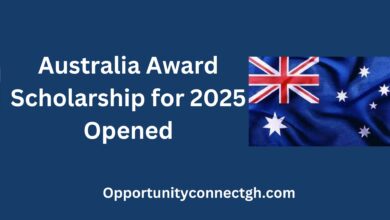Finding Sponsors for Graduate Studies in Europe in 2024.

Introduction: Sponsors for Graduate Studies in Europe in 2024
In 2024, the quest for advanced education in Europe presents a unique set of challenges and opportunities for aspiring graduate students. Central to this educational journey is the crucial task of finding sponsors. Securing sponsorship is more than just a financial necessity; it’s a strategic step towards unlocking the doors to prestigious European institutions and a world-class educational experience.
The pursuit of graduate studies in Europe can be a substantial financial undertaking. From tuition fees to living expenses, the costs can quickly add up, making sponsorships not just beneficial but often essential. These sponsorships alleviate the financial burden, enabling students to focus on their academic pursuits without the stress of financial constraints.
A Spectrum of Sponsorship Opportunities
In the landscape of ‘Sponsors for Graduate Studies in Europe in 2024’, there exists a diverse array of sponsorship types, each catering to different needs and academic aspirations. These include:
- Academic Scholarships: Offered by universities and colleges, these are based on academic excellence and often cover a significant portion of tuition fees.
- Corporate Sponsorships: These are industry-specific sponsorships, providing financial aid often coupled with professional opportunities post-graduation.
- Government Grants and Fellowships: Offered by both home and host country governments, these sponsorships support international educational exchange and research initiatives.
- NGO and Foundation Sponsorships: Provided by various non-governmental organisations, these sponsorships focus on specific fields of study or target underrepresented groups.
- Private Donors and Alumni Networks: Individual benefactors or alumni associations often offer sponsorships motivated by philanthropy and community building.
Each type of sponsorship offers unique benefits and requirements. Navigating this diverse terrain requires careful research, thorough preparation, and strategic planning. In 2024, the journey to find the right ‘Sponsors for Graduate Studies in Europe’ involves more than just securing financial support; it’s about finding a partnership that aligns with your academic goals, career aspirations, and personal values. This guide aims to explore these pathways, offering insights and strategies to help you embark on this pivotal phase of your academic journey.
Understanding Different Types of Sponsorships for Graduate Studies in Europe in 2024
Navigating the world of sponsorships is a key aspect of planning for graduate studies in Europe in 2024. Understanding the various types of sponsorships available can significantly enhance your chances of securing the necessary funding. Each type offers unique opportunities and caters to different needs and goals.
Academic Scholarships: Universities and Colleges
- Academic scholarships are primarily offered by universities and colleges themselves.
- They are typically merit-based, focusing on academic excellence and achievements.
- Such scholarships may cover a portion or the entirety of tuition fees and sometimes include living expenses.
- Researching the scholarship programmes of your chosen European institutions is essential.
Corporate Sponsorships: Industry-Specific Support
- Corporate sponsorships are offered by companies and are often aligned with specific industries or fields of study.
- These sponsorships may include additional perks such as internships, mentorship, and future employment opportunities.
- Ideal for students pursuing degrees in areas directly relevant to the sponsoring company’s industry.
- Building connections with industry leaders and attending career fairs can open doors to these sponsorships.
Government Grants and Fellowships
- Governments, both in the student’s home country and in European countries, offer grants and fellowships.
- These are often designed to promote international educational exchange and support research initiatives.
- They can cover tuition and research costs and sometimes provide a stipend for living expenses.
- Checking with governmental education departments and embassy websites is a good starting point.
Non-Governmental Organizations (NGOs) and Foundations
- NGOs and foundations offer sponsorships focusing on specific fields or social causes.
- These sponsorships might target underrepresented groups or specific research areas.
- They often have a broader scope, sometimes including support for travel, conferences, and networking events.
- Researching organisations aligned with your study and career goals is crucial.
Private Donors and Alumni Networks
- Sponsorships from private donors and alumni networks are often driven by philanthropy.
- These can be sourced through university alumni associations or private benefactors interested in supporting education.
- Networking and building connections within university alumni circles can be key to accessing these funds.
- Alumni-sponsored scholarships may also come with mentoring and networking benefits.
In 2024, finding the right ‘Sponsors for Graduate Studies in Europe’ requires a deep understanding of the different types of sponsorships available. Each type of sponsorship has its unique set of advantages and application processes. By identifying which type aligns best with your academic goals and personal circumstances, you can strategically approach the right sponsors and increase your chances of success.
Preparing to Seek Sponsorship for Graduate Studies in Europe in 2024
Embarking on the quest to secure sponsorship for graduate studies in Europe in 2024 requires meticulous preparation and strategic planning. It’s not just about finding opportunities; it’s about being the ideal candidate for those opportunities. Here’s how you can prepare yourself to be an attractive prospect for sponsors.
Assessing Your Eligibility and Requirements
- Begin by evaluating your eligibility for various sponsorship types. This includes understanding the specific criteria set by academic institutions, corporations, governments, NGOs, and private donors.
- Familiarise yourself with the requirements for each sponsorship type. This may involve academic qualifications, field of study, nationality, and other specific conditions set by the sponsor.
- Regularly check for updates on sponsorships, as criteria and requirements can change over time. Staying informed ensures you’re always ready to meet evolving demands.
Building a Strong Academic Profile
- Focus on excelling academically. A strong academic record is fundamental for most sponsorships, especially those that are merit-based.
- Engage in activities that enhance your academic profile, such as research projects, internships, publications, or participation in academic conferences and competitions.
- Seek opportunities that align with your chosen field of study. This could include specialised training, workshops, or online courses to bolster your expertise and skills.
Crafting a Compelling Personal Statement or Proposal
- A personal statement or proposal is often your first point of contact with potential sponsors. It needs to effectively convey your goals, motivations, and why you’re the best candidate for the sponsorship.
- Highlight your academic achievements, but also focus on personal qualities like determination, leadership, and how you plan to contribute to your field of study.
- Tailor your statement or proposal to each sponsor. Understand what they are looking for and how your academic and career goals align with their objectives.
- Be genuine and authentic in your writing. Sponsors are looking for candidates who are passionate and have a clear vision for their future.
Preparing to seek ‘Sponsors for Graduate Studies in Europe in 2024’ involves a holistic approach. It’s about aligning your academic aspirations with the requirements and expectations of potential sponsors. Through careful planning, continuous self-improvement, and a well-crafted personal narrative, you can position yourself as a standout candidate, ready to seize the opportunities that sponsorship can offer.
Strategies to Find Potential Sponsors for Graduate Studies in Europe in 2024
In 2024, finding the right sponsors for graduate studies in Europe requires a combination of diligent research, effective networking, and leveraging available resources. Here are strategic approaches to uncover and connect with potential sponsors.
Researching and Identifying Potential Sponsors
- Begin by conducting thorough research to identify organisations, institutions, and individuals that offer sponsorships for graduate studies.
- Focus on sponsors who align with your field of study or have a history of supporting students with similar academic interests and goals.
- Keep an eye on industry trends, as sponsors often align their support with evolving market needs and areas of research.
Networking Strategies: Academic Conferences, Seminars, and Online Platforms
- Attend academic conferences and seminars related to your field. These events are excellent opportunities to connect with potential sponsors and like-minded peers.
- Utilise online platforms such as LinkedIn, academic forums, and social media groups to network with professionals, alumni, and fellow students.
- Engage actively in discussions, share your academic interests, and seek advice or references for potential sponsorships.
Utilizing University Resources and Career Centers
- Explore the resources offered by your current or prospective universities. Many institutions have partnerships with sponsors and can provide valuable leads.
- Visit the career center or international office of your university to get information on available sponsorships and guidance on how to apply.
- Attend university-organized career fairs and networking events where potential sponsors might be present.
Exploring Online Databases and Scholarship Portals
- Make use of online scholarship databases and portals that list sponsorship opportunities for graduate studies in Europe. Websites like ScholarshipPortal and Study in Europe provide a wealth of information.
- Subscribe to newsletters and alerts from these portals to stay updated on new sponsorship opportunities and deadlines.
- Read through the eligibility criteria carefully, and note down the sponsorships that you qualify for.
In the quest for ‘Sponsors for Graduate Studies in Europe in 2024’, a multifaceted approach is key. By combining thorough research, strategic networking, and making the most of available resources, you can significantly increase your chances of finding the right sponsors for your graduate studies. Remember, persistence and a proactive attitude are crucial in this journey.
How to Approach and Secure Sponsorship for Graduate Studies in Europe in 2024
Securing sponsorship for graduate studies in Europe in 2024 demands a strategic and professional approach. Crafting a compelling proposal, effectively communicating with potential sponsors, and nurturing professional relationships are key steps in this process.
Crafting an Effective Sponsorship Proposal or Application
- Start with a clear and concise introduction of yourself, outlining your academic background and your aspirations for graduate studies.
- Tailor your proposal to align with the sponsor’s interests or focus areas. Demonstrate how your study goals align with their values or objectives.
- Clearly articulate the benefits for the sponsor, such as potential collaborations, research contributions, or promoting their commitment to education.
- Provide a detailed plan of your proposed studies, including the choice of university, course relevance, and how the sponsorship will be utilised.
Tips for Communicating with Potential Sponsors
- When reaching out to potential sponsors, maintain professionalism in all communications, whether via email, phone, or in person.
- Be concise and to the point, respecting the sponsor’s time. Clearly state the purpose of your communication in the initial interaction.
- Prepare for any questions or requests for additional information. Being well-prepared shows seriousness and professionalism.
- If possible, seek opportunities to meet potential sponsors at events or through mutual connections to establish a more personal connection.
Following Up and Maintaining Professional Relationships
- After initial communication, follow up politely. A gentle reminder can demonstrate your enthusiasm and commitment.
- If you secure sponsorship, express your gratitude formally. A thank-you letter or email is a good way to show appreciation.
- Keep your sponsors updated on your academic progress. Regular updates can foster trust and might lead to further support or recommendations.
- Maintain the relationship even after the sponsorship period. Networking is about building long-term connections that can be mutually beneficial.
Approaching and securing ‘Sponsors for Graduate Studies in Europe in 2024’ is a process that requires careful preparation, effective communication, and ongoing relationship management. By crafting a compelling proposal, engaging respectfully and professionally with potential sponsors, and maintaining those relationships, you can increase your chances of securing the necessary support for your graduate studies in Europe. Remember, every interaction is an opportunity to build a network that can support your academic and professional growth.
Overcoming Common Challenges in Finding Sponsors for Graduate Studies in Europe in 2024
Securing sponsorship for graduate studies in Europe can be a complex journey filled with various challenges. Understanding these obstacles and knowing how to navigate them is crucial for success in the ‘Sponsors for Graduate Studies in Europe in 2024’.
Dealing with Competition and Rejections
- Acknowledge the reality: The quest for sponsorship is highly competitive. Be prepared to face rejections as part of the process.
- Learn from Rejections: Analyse any feedback received and use it to refine your approach. Each rejection can provide valuable insights for improvement.
- Stay Resilient: Persistence is Key. Continue applying and exploring different opportunities, even after facing setbacks.
- Broaden Your Search: Expand your search criteria and consider various types of sponsorships that might suit your profile and goals.
Balancing Multiple Sponsorship Offers
- Evaluate Each Offer: If you’re fortunate to receive multiple offers, assess each one carefully. Consider factors like the amount of funding, conditions attached, and alignment with your academic objectives.
- Seek Guidance: Consult with mentors, advisors, or peers to help weigh the pros and cons of each offer.
- Communicate transparently: If you need time to decide, communicate this to the sponsors. Honesty about your decision-making process can be beneficial.
- Make an informed decision: choose the sponsorship that best supports your academic plans and offers the most beneficial terms.
Navigating Legal and Financial Obligations
- Understand the Terms: Carefully read any legal agreements or contracts. Ensure you understand all terms and conditions related to the sponsorship.
- Seek Legal Advice: If certain aspects are unclear, don’t hesitate to seek legal counsel. It’s important to fully understand your commitments and obligations.
- Manage Finances Wisely: Plan how you will utilise the sponsorship funds. Budgeting for tuition, living expenses, and any additional costs is crucial.
- Compliance: Ensure that you comply with all requirements, such as academic performance standards or any reporting obligations linked to the sponsorship.
In the pursuit of ‘Sponsors for Graduate Studies in Europe in 2024’, being prepared to face and overcome these challenges is critical. Dealing effectively with competition, managing multiple offers judiciously, and understanding your legal and financial responsibilities are all integral to securing and maintaining a successful sponsorship. With resilience, strategic planning, and informed decision-making, these hurdles can be navigated successfully, paving the way to achieving your academic aspirations in Europe.
Additional Resources for Finding Sponsors for Graduate Studies in Europe in 2024
In the pursuit of finding sponsors for graduate studies in Europe, various resources can provide invaluable assistance. Here’s a list of useful websites, scholarship databases, and upcoming events that can guide you in your quest for sponsorship in 2024.
Key Websites and Scholarship Databases
- Erasmus Mundus Joint Master Degrees: [Erasmus Mundus] (https://eacea.ec.europa.eu/erasmus-plus/library/scholarships-catalogue_en) offers a variety of scholarships for international students, including those from outside Europe.
- DAAD Scholarship Database: The [German Academic Exchange Service (DAAD)] (https://www.daad.de/en/) provides a comprehensive database of scholarships for studying in Germany.
- Chevening Scholarships: Explore the Chevening website (https://www.chevening.org/) for UK government scholarships.
- Campus France: [Campus France] (https://www.campusfrance.org/en) is a great resource for scholarships in France.
- Study in Holland: The [Study in Holland website](https://www.studyinholland.nl/) provides information on scholarships for studying in the Netherlands.
- Euraxess: [Euraxess] (https://euraxess.ec.europa.eu/) offers a range of funding opportunities for research and innovation endeavours.
Upcoming Workshops and Webinars
- Keep an eye on university websites and educational forums for announcements regarding workshops or webinars on securing sponsorships for graduate studies.
- Organizations such as the British Council, Goethe-Institut, and Alliance Française often conduct informative sessions on studying in Europe, including how to find sponsorships.
FAQs: Answering Common Questions About Graduate Study Sponsorships in Europe
How can I find sponsors for my graduate studies in Europe in 2024?
– Start by researching scholarship databases, contacting universities directly, and exploring governmental and non-governmental funding options. Networking and attending relevant educational events can also be beneficial.
What types of sponsorships are available for graduate students in Europe?
– Sponsorships can range from academic scholarships, corporate sponsorships, government grants, fellowships, to support from NGOs, foundations, and private donors.
Are there sponsorships specific to certain fields of study?
– Yes, some sponsorships are targeted towards specific fields like science, technology, engineering, and mathematics (STEM), humanities, or arts. Research specific scholarships in your field of interest.
Can I get a full sponsorship that covers all my expenses?
– While some sponsorships offer full funding, including tuition, living expenses, and travel, others may only cover part of these costs. It’s important to read the terms of each sponsorship carefully.
What should I include in my sponsorship application?
– Your application should typically include a strong personal statement or proposal, academic transcripts, letters of recommendation, proof of language proficiency, and any other required documents.
How competitive is it to secure sponsorship for graduate studies in Europe?
– The competition can be intense, depending on the sponsorship program. It’s crucial to have a strong academic record and a compelling application to stand out.
Can I apply for multiple sponsorships at the same time?
– Yes, you can apply for multiple sponsorships simultaneously, but make sure you meet the eligibility criteria for each and tailor your application accordingly.
When should I start applying for sponsorships?
– Start your search and application process as early as possible, preferably at least a year before your intended start date, as many scholarships have early deadlines.
Utilizing these resources and understanding the common queries associated with ‘Sponsors for Graduate Studies in Europe in 2024’ can significantly enhance your chances of finding suitable sponsorship for your academic journey. The key is to remain informed, proactive, and diligent in your search and application process.




